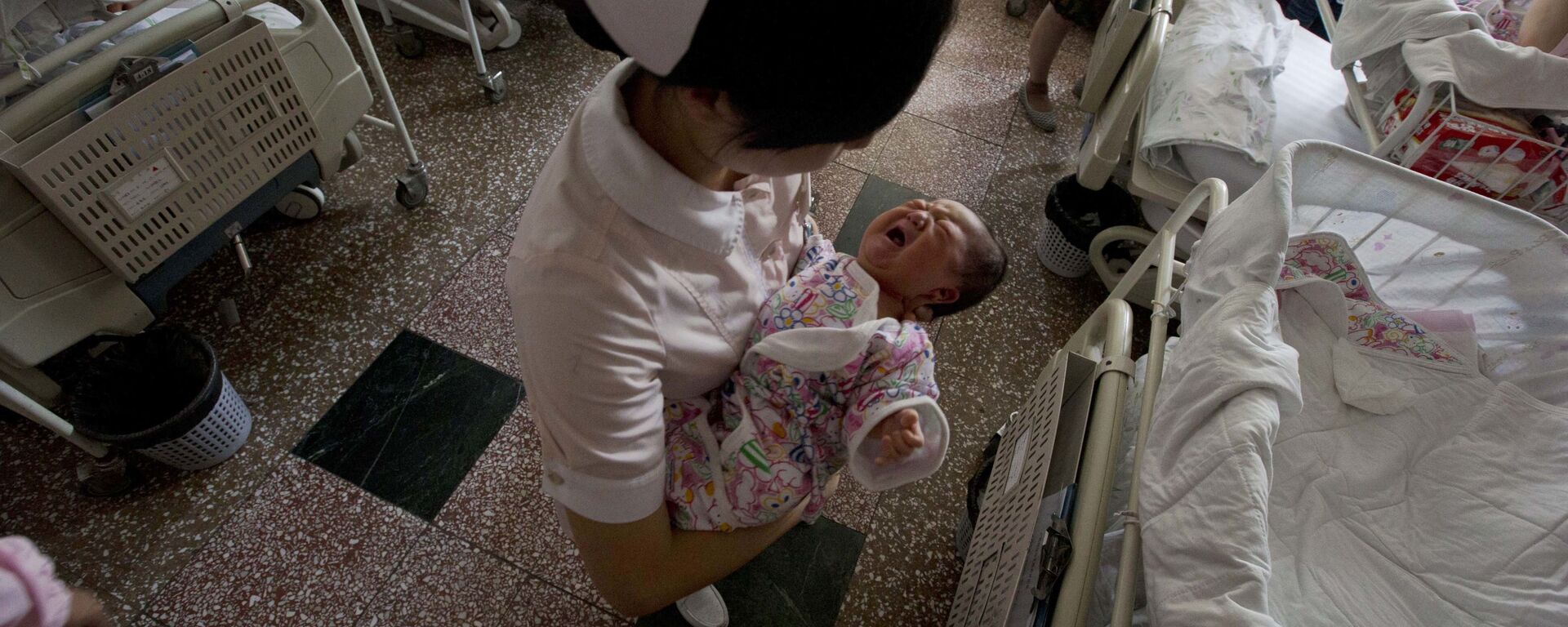https://sputnikglobe.com/20230117/the-great-fall-demographic-crisis-takes-toll-on-china-population-ebbs-for-first-time-in-decades-1106418621.html
The Great Fall: Demographic Crisis Takes Toll on China, Population Ebbs for First Time in Decades
The Great Fall: Demographic Crisis Takes Toll on China, Population Ebbs for First Time in Decades
Sputnik International
China has long had a birth rate of under 2.1 children per woman, largely due to the one-child policy. But even as the policy was modified and then lifted in 2015, the birth rate has continued to shrink
2023-01-17T08:57+0000
2023-01-17T08:57+0000
2023-01-24T11:29+0000
china
population
birth rate
authorities
family
restrictions
asia
https://cdn1.img.sputnikglobe.com/img/07e6/07/0c/1097220987_0:0:3072:1728_1920x0_80_0_0_4770874d48a5ee88b7af83ae93ea39e9.jpg
China's population plummeted last year for the first time in six decades, the country's National Bureau of Statistics has revealed.According to the bureau, the number declined by about 850,000 to more than 1.4 billion at the end of 2022.China’s male population stood at 722.06 million, while the female population was estimated at 689.69 million, and "the sex ratio of the total population was 104.69 (104.69 men per 100 women)," the statement read.The bureau also said that the population at the working age, from 16 to 59, amounted to 875.6 million (62% of China's total population), the number of people aged 60 and over was 280 million (19.8%) and population aged 65 and over was 209.8 million (14.9%).The gender balance of the Chinese population was seriously affected by the so-called "one-child" policy, introduced in 1979 in order to prevent overpopulation and famine. Under this policy, urban families only had the right to have only one child, while rural families could have two children, but only if the first one was a girl.In 2013, the Chinese authorities eased the restrictions. Couples, where at least one of the spouses was the only child in the family, were allowed to have a second child. Later, in 2016, all couples were allowed to have a second child. However, the measures not only did not cause a boom in the birth rate, they resulted in the exact opposite effect.In the summer of 2021, the authorities approved the adoption of amendments to the law on population. The amendments allowed families to have a third child and canceled all previously provided fines and payments.
https://sputnikglobe.com/20221017/china-to-enact-policies-to-boost-birth-rates-1101910779.html
china
Sputnik International
feedback@sputniknews.com
+74956456601
MIA „Rossiya Segodnya“
2023
Oleg Burunov
https://cdn1.img.sputnikglobe.com/img/07e4/09/0b/1080424846_0:0:2048:2048_100x100_80_0_0_3d7b461f8a98586fa3fe739930816aea.jpg
Oleg Burunov
https://cdn1.img.sputnikglobe.com/img/07e4/09/0b/1080424846_0:0:2048:2048_100x100_80_0_0_3d7b461f8a98586fa3fe739930816aea.jpg
News
en_EN
Sputnik International
feedback@sputniknews.com
+74956456601
MIA „Rossiya Segodnya“
Sputnik International
feedback@sputniknews.com
+74956456601
MIA „Rossiya Segodnya“
Oleg Burunov
https://cdn1.img.sputnikglobe.com/img/07e4/09/0b/1080424846_0:0:2048:2048_100x100_80_0_0_3d7b461f8a98586fa3fe739930816aea.jpg
china's population, decrease in china's population for the first time in six decades, birth rate in china, china's 'one child' policy
china's population, decrease in china's population for the first time in six decades, birth rate in china, china's 'one child' policy
The Great Fall: Demographic Crisis Takes Toll on China, Population Ebbs for First Time in Decades
08:57 GMT 17.01.2023 (Updated: 11:29 GMT 24.01.2023) China has long had a birth rate of under 2.1 children per woman, largely due to the one-child policy. But even as the policy was modified and then lifted in 2015, the birth rate has continued to shrink.
China's population plummeted last year for the first time in six decades, the country's National Bureau of Statistics has revealed.
According to the bureau, the number declined by about 850,000 to more than 1.4 billion at the end of 2022.
"By the end of 2022, the national population was 1,411.75 million (including the population of 31 provinces, autonomous regions and municipalities and servicemen, but excluding residents of Hong Kong, Macao and Taiwan and foreigners living in the 31 provinces, autonomous regions and municipalities), a decrease of 0.85 million over that at the end of 2021," the statistical office said in a statement on Tuesday.
China’s male population stood at 722.06 million, while the female population was estimated at 689.69 million, and "the sex ratio of the total population was 104.69 (104.69 men per 100 women)," the statement read.
"In 2022, the number of births was 9.56 million with a birth rate of 6.77 per thousand; the number of deaths was 10.41 million with a mortality rate of 7.37 per thousand; the natural population growth rate was minus 0.60 per thousand," the statistical office added.
The bureau also said that the population at the working age, from 16 to 59, amounted to 875.6 million (62% of China's total population), the number of people aged 60 and over was 280 million (19.8%) and population aged 65 and over was 209.8 million (14.9%).
The gender balance of
the Chinese population was seriously affected by the so-called "one-child" policy, introduced in 1979 in order to prevent overpopulation and famine. Under this policy, urban families only had the right to have only one child, while rural families could have two children, but only if the first one was a girl.

17 October 2022, 03:58 GMT
In 2013, the Chinese authorities eased the restrictions. Couples, where at least one of the spouses was the only child in the family, were allowed to have a second child. Later, in 2016, all couples were allowed to have a second child. However, the measures not only did not cause a boom in the birth rate, they resulted in the exact opposite effect.
In the summer of 2021, the authorities approved the adoption of amendments to the law on population. The amendments allowed families to have a third child and canceled all previously provided fines and payments.




